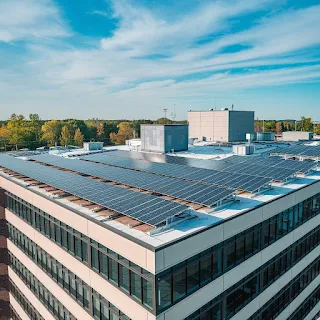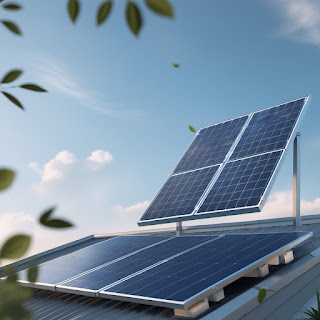Solar Panel Commercial Installation
Comprehensive Guide to Solar Panel Commercial Installation
As businesses increasingly seek sustainable and cost-effective energy solutions, solar panel installation has emerged as a viable option. Commercial solar installations provide numerous benefits, including reduced energy costs, increased property value, and a positive environmental impact. This guide explores the various aspects of solar panel commercial installation, including the benefits, the installation process, and key considerations for businesses.
Understanding Commercial Solar Installation
Commercial solar installation involves the setup of photovoltaic (PV) systems on commercial properties to generate electricity from sunlight. These systems can vary in size, complexity, and design, depending on the energy needs of the business and the available roof or ground space.
Types of Commercial Solar Systems
Rooftop Solar Systems: These systems are installed on the rooftops of commercial buildings. They are ideal for businesses with adequate roof space and orientation to sunlight.
Ground-Mounted Solar Systems: For businesses with limited roof space, ground-mounted solar systems can be installed on the property’s grounds. These systems are typically larger and can produce more energy.
Solar Carports: These are structures that combine parking and solar power generation. Solar panels are installed on canopies that provide shade for parked vehicles while generating electricity.
Community Solar Projects: Businesses can participate in community solar programs where they invest in shared solar farms. This option is beneficial for those unable to install solar panels on-site.
Key Benefits of Solar Panel Installation for Businesses
Cost Savings: One of the most compelling reasons to install solar panels is the potential for significant savings on electricity bills. By generating their own energy, businesses can reduce reliance on the grid and mitigate energy price fluctuations.
Tax Incentives and Rebates: Various federal and state incentives make solar installations more affordable. The federal Investment Tax Credit (ITC) allows businesses to deduct a significant percentage of the installation costs from their federal taxes. Additionally, many states offer rebates and incentives to further lower costs.
Enhanced Property Value: Commercial properties equipped with solar energy systems can have increased property values. A solar installation is seen as an asset that can appeal to environmentally conscious tenants and buyers.
Sustainability and Corporate Responsibility: By going solar, businesses can demonstrate their commitment to sustainability and corporate social responsibility. This can enhance brand reputation and customer loyalty, particularly among eco-conscious consumers.
Energy Independence: Solar power provides businesses with more control over their energy production. By generating their own electricity, companies are less vulnerable to utility rate increases and energy shortages.
The Solar Panel Installation Process
The process of installing solar panels in a commercial setting typically involves several key steps:
Site Assessment: The first step is to conduct a thorough assessment of the property. Solar professionals evaluate the roof’s condition, orientation, and shading to determine the best installation options.
System Design: Based on the site assessment, a solar provider will design a customized solar system tailored to the business’s energy needs. This includes selecting the type of solar panels, inverters, and mounting systems.
Permitting: Before installation, the necessary permits must be obtained from local authorities. This process ensures that the installation complies with building codes and regulations.
Installation: Once permits are secured, the installation team will set up the solar panels, inverters, and electrical connections. The process can take anywhere from a few days to several weeks, depending on the system's size and complexity.
Inspection and Interconnection: After installation, the system is inspected by local authorities to ensure compliance with safety standards. Once approved, the system is connected to the grid, allowing the business to start generating electricity.
Monitoring and Maintenance: After installation, ongoing monitoring ensures the system operates efficiently. Regular maintenance, such as cleaning the panels and checking connections, helps maximize energy production.
Key Considerations for Commercial Solar Installation
Financing Options: Businesses can choose from various financing options for solar installation, including outright purchases, leases, and power purchase agreements (PPAs). Each option has its advantages and drawbacks, so it’s essential to evaluate which best fits the company's financial situation.
Choosing a Solar Provider: Selecting a reputable solar installation company is crucial for a successful project. Businesses should research potential providers, check reviews, and request references. A reliable provider will offer warranties and ongoing support.
System Sizing: It’s essential to accurately size the solar system to meet the business’s energy needs. An oversized system can lead to unnecessary costs, while an undersized system may not provide sufficient energy.
Incentives and Rebates: Staying informed about available tax incentives and rebates is critical for reducing installation costs. Businesses should consult with solar professionals to understand current incentives.
Local Regulations: Different regions have various regulations regarding solar installations. Understanding these local laws is crucial to ensure compliance and avoid potential fines.
Conclusion
Solar panel commercial installation represents a powerful opportunity for businesses to save on energy costs while contributing to a sustainable future. By understanding the benefits, installation process, and key considerations, businesses can make informed decisions about adopting solar energy. With the continued advancements in solar technology and growing emphasis on sustainability, the future of commercial solar installations looks bright. Investing in solar not only makes financial sense but also enhances a business's reputation as a forward-thinking and responsible entity.
https://arena.gov.au/renewable-energy/solar/
https://www.vincent.wa.gov.au/our-neighbourhood/environment-liveability/sustainability/solar.aspx



Comments
Post a Comment